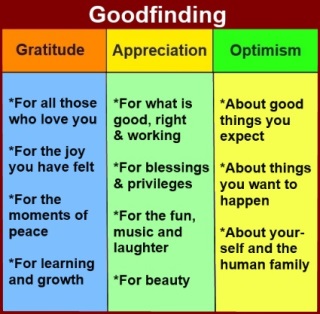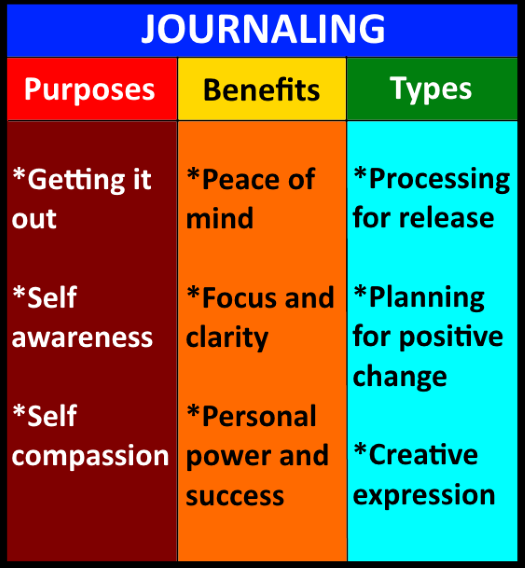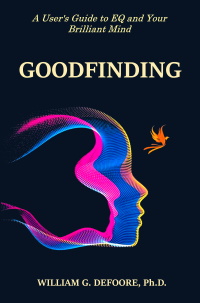Goodfinding Journaling
Your Key To Peace Of Mind & Positive Change
Authored by William G. DeFoore, Ph.D.
Journaling is your best possible tool for taking charge of your thoughts and beliefs. You want your thoughts to work for you, not against you, right? Of course...so here's your chance to learn and master a daily process that is free, easy and powerfully effective.
What do we mean by journaling? As we're using the term here it means simply writing about your experiences, thoughts, feelings and plans on a regular, ongoing basis. When you add the Goodfinding component, you're just making sure that your outcomes are positive and to your lasting benefit.
Here is a simple chart that gives you an overview of this type of writing exercise, and what we'll cover on this page:
What Are The Purposes Of Journaling?
If you were a professional musician, would you ever consider going on stage for a performance without tuning your instrument? Of course not!
Your daily writing process is as simple as that. When you take a few minutes each morning to journal your thoughts, reflections and plans for your day, you are tuning the instrument of your mind and emotions. That way, you'll make better music all day.
Let's look further into the purposes:
- Getting it out -- Your thoughts, feelings and expectations are rattling around in your head all day, every day. When you get them out on paper, you're slowing them down, where you can see them, understand them, and benefit more from the workings of your own mind.
- Self awareness -- This is the first step to Emotional Intelligence, and a key to every positive change you want to make in your life. You will find your "self" in there, inside those thoughts, feelings and perceptions that you're writing down, and when you use the Goodfinding approach, you'll like what you find.
- Self compassion -- A positive relationship with yourself is one of the greatest assets you can develop in life. Without self awareness there can be no self compassion, and with compassion comes true understanding and lasting healthy self esteem.
To fully understand these purposes, you'll need to read on and take a look at the benefits and types of journaling. So, keep going, and you'll find some amazing rewards for your journey.
What Are The Benefits Of Journaling?
Tips and Techniques
1) Do it in the morning with a hot beverage, for best results.
2) Write with pen on paper, to access more emotion and right brain processes.
3) Listen to inspirational, uplifting music.
4) Sit outside when you can, ideally with your bare feet on the earth.
5) If indoors, choose a soothing, comfortable environment with natural light and plants.
In one word...huge. Your benefits from these writing exercises are ultimately nothing less than exactly what you want in life, regarding your health, happiness and success.
Let's jump in further to these benefits:
- Peace of mind -- Well, I told you the benefits were huge. I can tell you many reasons you will get peace of mind from this, but ultimately you're going to have to try it to see for yourself. Simply put, you will gain more peace of mind as a result of knowing, appreciating and developing yourself in a more intentional and positive manner.
- Focus and clarity -- You know that great feeling of knowing clearly where you are, what you're doing and where you're going? That's what we're talking about here. When you practice the skills we are outlining for you here, you will be able to use the powerful tool of your mind successfully.
- Personal power and success -- You will literally feel more and more powerful as you discover that you can successfully change yourself and your life in the ways that you choose. The change we're talking about here is more happiness, better health and greater success in all of your personal and business relationships.
Now, watch this brief 8 minute video, that gives an overview of Goodfinding journaling and how it can help you.
What Are The Types Of Journaling?
Since this is such a powerful tool for your personal growth and development, be sure you understand the different types of journaling, and learn to use and benefit from them all.
Here are the three types we'll cover here:
- Processing for release -- This includes some actual healing benefits. As you release old toxic emotions, your physical health will actually improve, as demonstrated in the journaling research of Dr. James Pennebaker. He found consistent results showing that subjects who wrote about personal trauma became physically healthier. Learn more about how to write for release.

- Planning for positive change -- Here's where the Goodfinding process really kicks in. You lay the groundwork with gratitude for the past and appreciation for the present, then you get very focused on what good things you want to create for yourself in your future. Be sure and watch the video above to get further guidance on this type of positive writing process.
- Creative expression -- We're not talking about creative writing here, we're talking about creating your own reality with your writing process. Your steps are to write about 1) what you want 2) why you want it and 3) how great you will feel when you have it. Don't hold back on this part. Really do your best to believe that you will achieve your desired outcome.
Those are your tools for literally rewiring your brain to make it work for you to its maximum capacity. Never underestimate the power of your mind to create the reality that you choose for yourself.








New! Comments
We'd love to hear from you! Leave us a comment in the box below.